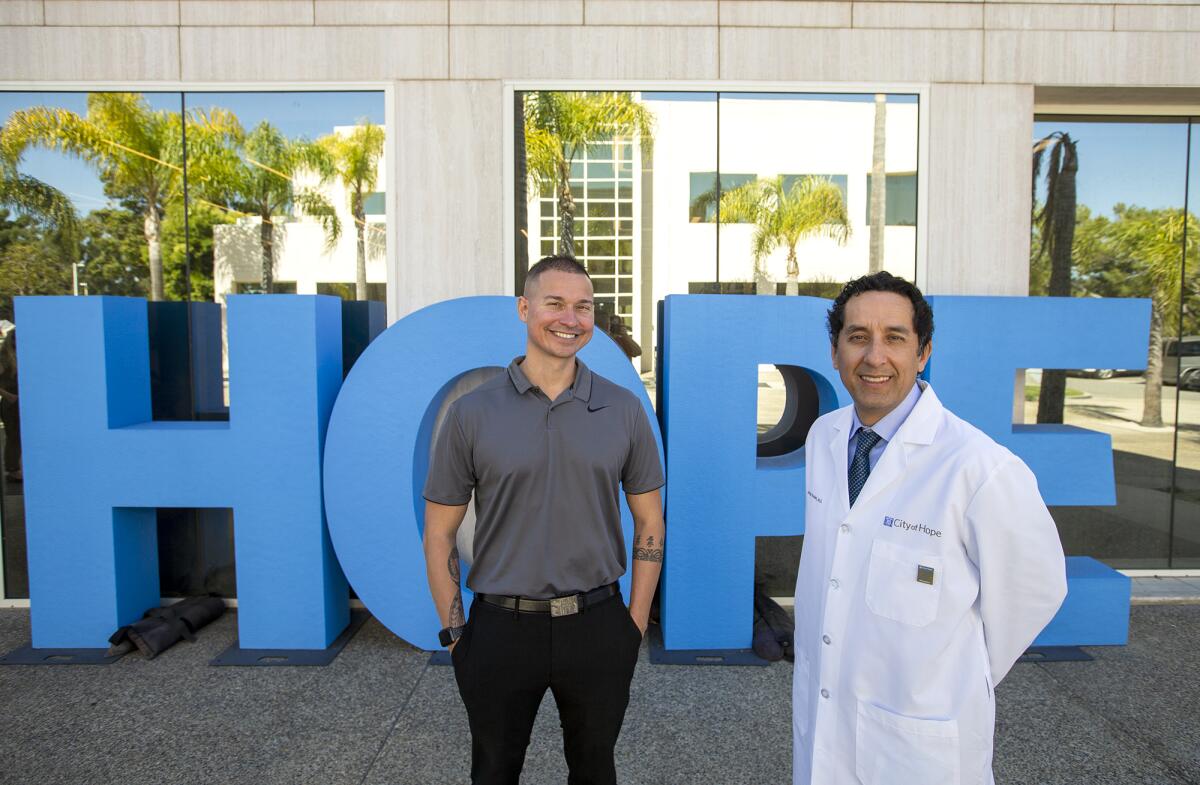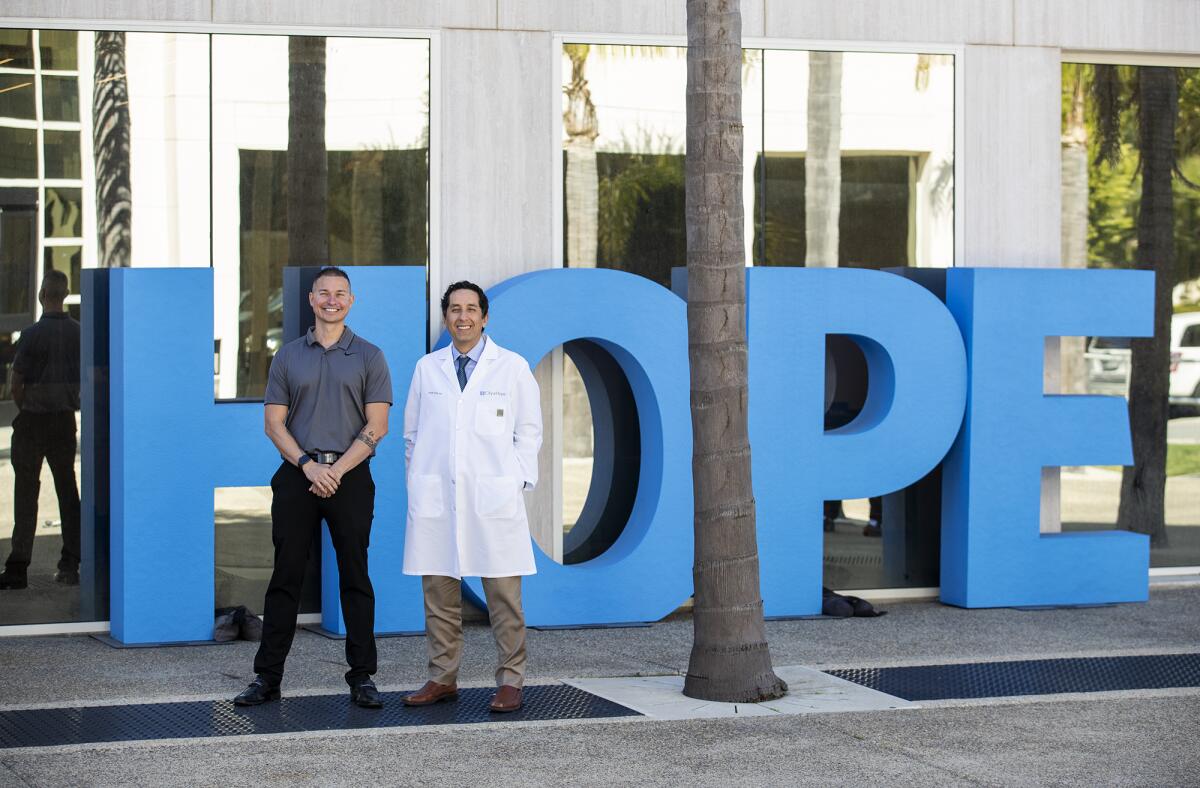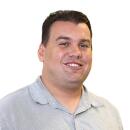City of Hope Newport Beach preaches colorectal cancer awareness

Will Godoy sure is glad he found City of Hope Newport Beach.
It started with abdominal pains with Godoy. He was a half-marathon runner. He was 35 and had 0.8% body fat. He had no family history of colon cancer, and no clue of the hardships that would be coming next.
At first, doctors thought it was colitis. They put him on antibiotics and a liquid diet, but once he started eating food again the pain returned. That led to an emergency room visit in December 2014.
“My wife [Crystal] looked over at me and asked, ‘What do you think it is?’” Godoy remembered. “I said, ‘Honestly, I think the only thing left is cancer.’ She said, ‘Don’t think about that.’ Then the ER doctor comes in and he looks like he saw a ghost.”
They had found a tumor the size of a golf ball in his colon, and it looked like the cancer had spread. Godoy, who lives in Mission Viejo, needed emergency surgery. He said he woke up with a 16-inch line from his sternum down to below his waistline, and a colostomy.
Soon after, an oncologist told him he had three months to live. Godoy sought a second opinion, and that’s where City of Hope came in. He said he appreciated their personable approach.
He first made the drives to City of Hope in Duarte or to its Rancho Cucamonga facility, but Godoy has been making the much shorter commute to City of Hope Newport Beach since it opened in February 2020.
After undergoing seven surgeries and two extensive chemotherapy sessions within a three-year period, among other treatments, Godoy’s stage four colon cancer is now at bay. Now 42, he remains active and in excellent shape, and is employed full time as a manager of career development for BJ’s Restaurants.
City of Hope wants more success stories. March is national Colorectal Cancer Awareness Month, and the organization is urging people to get screened early.

City of Hope Newport Beach oncologist Dr. Misagh Karimi, who has worked with Godoy over the last two years, said colon cancer cases are up among the younger population. One in five colorectal cancer diagnoses are in people ages 20 to 54, he said.
“Overall, the numbers have come down if you look at the entire population,” Karimi said. “Part of it is because of screening. But when you look at the younger population, the numbers are going up quite a bit. The majority of them don’t have inherited abnormalities. What’s left really is lifestyle.
“We’re unfortunately seeing that spending more time sitting down and less time outside exercising, it does affect that. We do see that about half of the younger patients who are diagnosed with colon cancer are overweight.”
According to the National Cancer Institute, about 4.1% of men and women will be diagnosed with colorectal cancer at some point during their lifetime, based on 2016–18 data. In 2018, more than 1.3 million people were estimated to be living with colorectal cancer in the United States.
Traditional wisdom recommends starting with colonoscopies as early as 40 years old. But Karimi said that preventive measures should start much younger than that.
“It’s really hard to change your behavior at age 40, if you’re used to a certain lifestyle or certain diet,” he said. “This is what I tell my kids, it starts now. When you’re young, you think you are invincible, nothing can touch me, this is for later in life. That’s not true, because you actually start programming yourself at a young age. To change that all of a sudden, it’s a good thing, no question, but the sooner you get on the prevention train the better it is. That’s the best way to approach cancer, to try to prevent it in the first place.”
The American Cancer Society guidelines for prevention recommend maintaining a healthy body weight throughout life and engaging in 150 to 300 minutes of moderate-intensity physical activity per week, or 75 to 150 minutes of vigorous-intensity physical activity. It also recommends a healthy eating pattern including a variety of vegetables, fruits and whole grains.
“The [World Health Organization] came out a few years ago and said that processed meat is a carcinogen,” Karimi said. “Increasing fresh fruits and vegetables, changing that ratio is very important.”
Godoy, whose wife gave birth to son William in September 2015 just before he started chemotherapy, is grateful for the support of family and friends.
“A lot of my goals, I use my son and wife and how I was prior,” he said. “It’s like, can I be athletic again? Can I see my son graduate eighth grade, graduate high school, graduate college? Can I be there when he gets married?”
He’s off to a good start. Godoy plans to compete in a mini-triathlon in Pasadena next weekend, on March 12. As for advice, he echoes Karimi that it’s good to know a diagnosis as early as possible.
“Even though it’s been a struggle, it’s really molded me into this person who I am today,” he said. “Cancer is not a joke, and I feel like people should be aware of it. They should understand that you can prevent it … if you get enough information early enough.”
All the latest on Orange County from Orange County.
Get our free TimesOC newsletter.
You may occasionally receive promotional content from the Daily Pilot.




